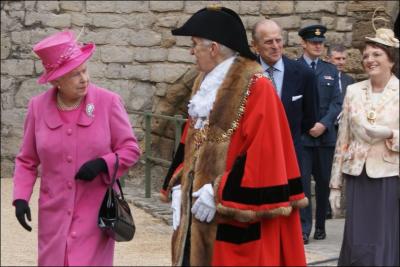Notional seats in Wales provoke a row
The BBC’s coverage of the General Election in Wales has triggered an angry response from the Mayor of Caernarfon, Councillor Hywel Roberts.
In between greeting the Queen and the Duke of Edinburgh on their visit to the town last week (pictured below), Mr Roberts bent the ear of Andrew Marr - who chanced to be there - and fired off a string of complaints to the BBC. A statistician by profession, Mr Roberts was far from satisfied with the answers he got.
His complaint is that the BBC is using the results of the 2005 election in Wales to estimate the likely outcomes this time round, using “notional” 2005 results for seats where there have been boundary changes. This is nonsense, he says, because an election in Wales has already been held under the new constituency boundaries, the 2007 Welsh Assembly election. Why not use these real results rather than the notional ones?
The question is entirely reasonable, but the BBC’s response has failed to satisfy him. It says that it is using notional 2005 results across the country to “avoid confusion” and that independent polling experts have estimated the votes for each party in every new or changed seat as if it had been fought in the 2005 General Election.
Yes, yes, says Mr Roberts, I know that very well, but it doesn’t answer my question. Why not use real results rather than notional ones, especially as they are more up to date?
Ian Jolly for the BBC (who didn’t give his job title) says in response that people vote differently in different elections, which may be true. But he weakens his case by immediately citing the different levels of support for UKIP in the 2004 European Elections and in the last General Election (16 per cent in the first, 2.2 per cent in the second.) But Mr Roberts never mentioned the European elections, which were fought on a different voting system and in different constituencies.
The consequence of the BBC’s policy is that, while Plaid Cymru had three seats in the last Parliament, “notionally” it had only two. So if it wins three on Thursday, it will have made a gain by BBC measures, though it will not actually have gained at all.

Councillor Roberts interrupts his row with the BBC for a more important date
This is a problem common across the election, apart from Scotland where the boundaries are unchanged. The make-up of the old house was Labour 356, Conservative 198, and LibDem 62. After taking account of boundary changes, the “notional” make-up of the house, worked out by Professors Colin Rallings and Michael Thrasher, was Labour 349, Conservative 210, and LibDem still 62. So the Conservatives will have to gain more than 12 seats before they are deemed to have gained at all. That clear? You’ll have to concentrate a bit harder on election night.
The job ought to have been easy. Constituencies are made up of electoral wards, so if a count of votes had been available for every ward for the 2005 General Election, one could fairly easily calculate the new constituency results from the wards transferred. But peculiarly, ward-level data is not collected at General Elections so the two profs have to make use of ward data collected at local elections.
This means, among other things, that the “notional” 2005 results are already partly based on votes cast at a different kind of election, exactly the argument used by the BBC to reject Mr Roberts’ complaint. See the LSE election website for a scholarly analysis of these changes.
The BBC has used the notional 2005 General Election results before, when covering the 2007 Welsh Assembly election. They proved disastrously wrong, says Mr Roberts, whose political allegiance is to Plaid Cymru – though in the BBC’s defence it must be said that the figures are not meant to predict the result, but merely to say what it would have been if voters behaved as they did in 2005.
"To use 2005 guesstimates for the election results when 2007 actual figures are available goes against all statistical principles” Mr Roberts complains. “Please explain to me why you disagree with this statement.” You can almost sense his blood pressure rising. He’s copied his complaint to the National Statistician and to Professor David Hand, President of the Royal Statistical Society.
The BBC’s answer, though it appears reluctant to say so, is that it prefers to use the same measure across the UK even if it makes a bit of a nonsense in Wales. And Mr Roberts can’t even take his custom elsewhere: ITN, Sky News and the Press Association, along with The Daily Telegraph, The Times and The Guardian will all be using Rallings and Thrasher.



